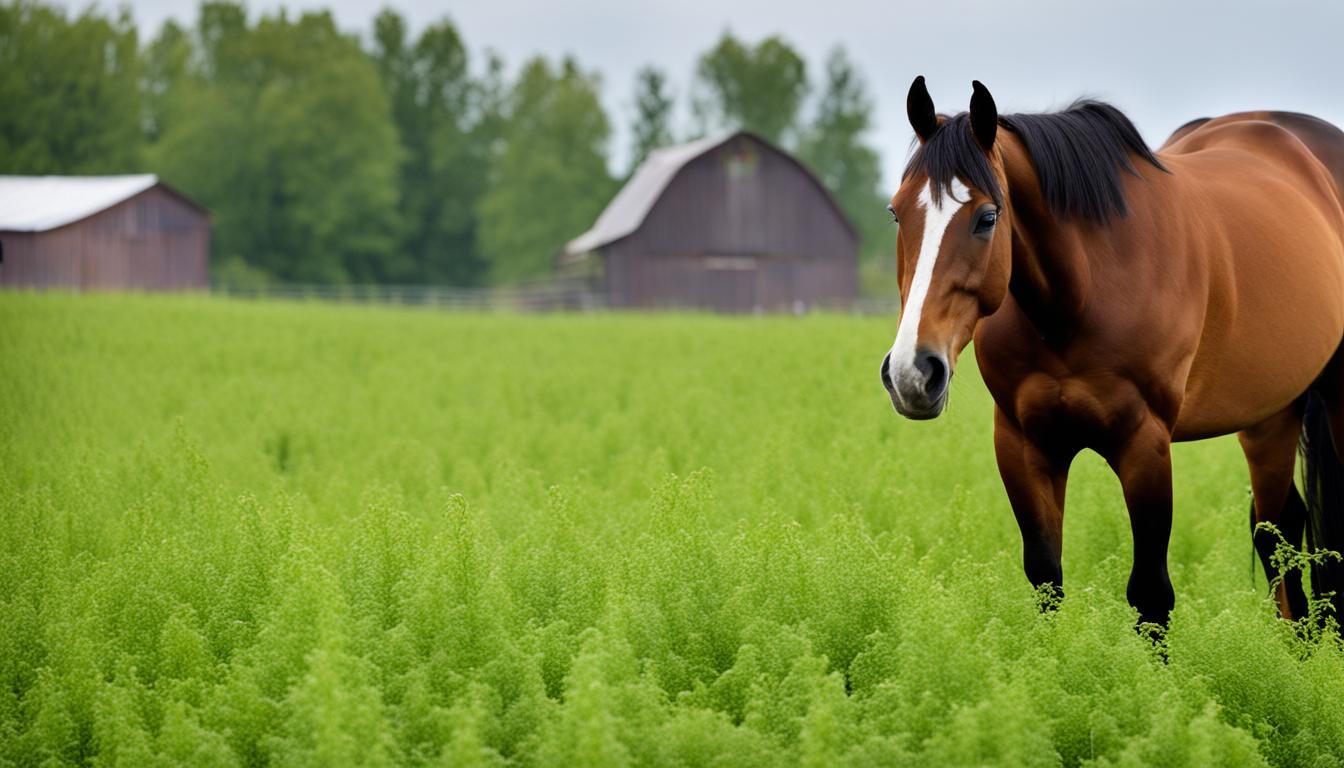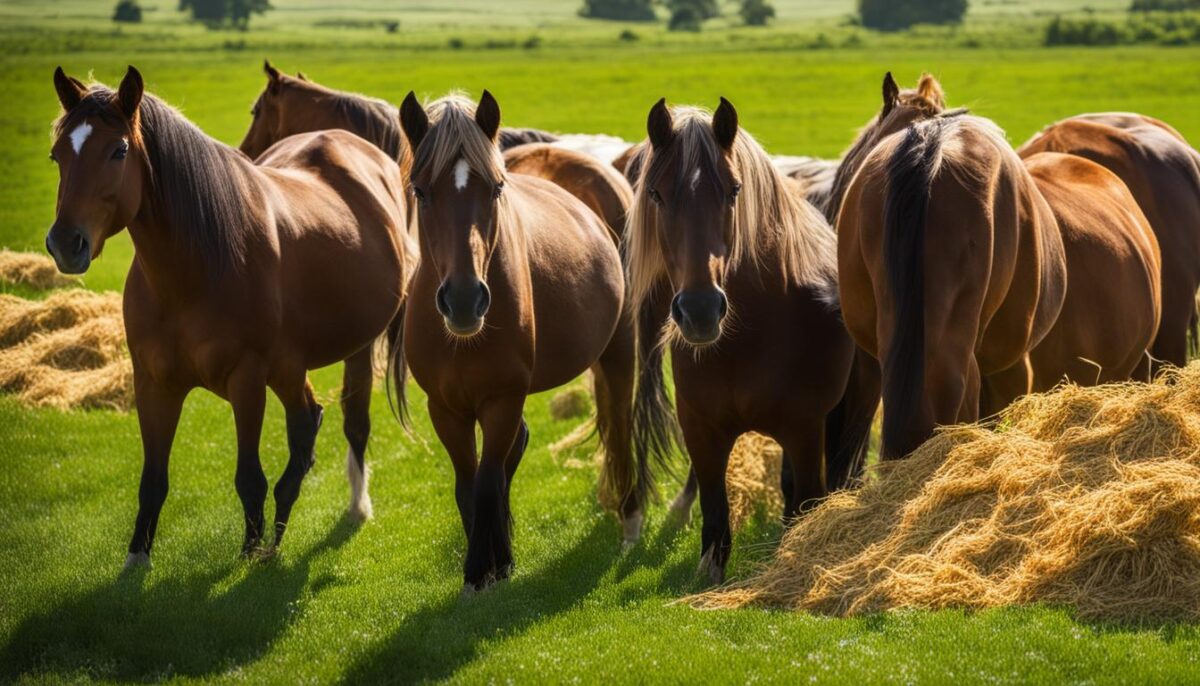When it comes to providing a balanced and nutritious equine diet, many horse owners wonder if alfalfa is a suitable and beneficial option. A popular forage for horses, alfalfa boasts several health advantages that can meet the needs of various individuals within the equine community. Understanding its nutritional properties and suitability for different types of horses is essential for ensuring a proper horse nutrition plan. Let’s explore the world of alfalfa and its place in feeding horses.
Key Takeaways
- Alfalfa offers essential nutrients vital to a horse’s diet.
- It is high in protein, calcium, and energy for horses with particular nutritional needs.
- Not all horses should consume alfalfa; suitability depends on each horse’s specific requirements and conditions.
- Alfalfa comes in various forms such as hay, cubes, and pellets, catering to individual preferences and needs.
- Understanding and following the right feeding practices is crucial when incorporating alfalfa into a horse’s diet.
The Nutritional Benefits of Alfalfa in a Horse’s Diet
Alfalfa is often referred to as the “Queen of Forages” due to its impressive nutritional profile, making it a popular choice for equine diets. This high-protein forage is packed with essential minerals and offers an energy-rich diet for horses. Let’s take a closer look at the benefits of alfalfa for horse growth and overall health.
High Protein Content for Growing and Performance Horses
Alfalfa has a high protein range of 18-24% which makes it an ideal forage for growing young horses and those participating in high-performance activities. Containing more crude protein and calcium than grass hays like timothy or orchardgrass, alfalfa helps support proper muscle development and strength. However, it’s crucial to balance your horse’s protein intake to avoid excessive growth rates or developmental issues.
Essential Minerals for Equine Health
Rich in crucial minerals, alfalfa provides higher levels of calcium than other forages. Calcium is necessary for bone development and maintaining optimal health in horses. In addition, alfalfa contains other essential minerals, contributing to a well-rounded and nutritious diet.
Energy Provision for Active Horses
Alfalfa is not only about its protein and mineral content – it also offers a significant energy source, perfect for horses with high caloric demands. For instance, lactating broodmares and performance horses can greatly benefit from an energy-rich alfalfa diet. However, as with any feed, it’s essential to monitor each horse’s energy needs to keep their diet well-balanced and suited to their specific requirements.
In conclusion, alfalfa is a valuable addition to equine diets due to its high-protein content, essential minerals, and energy provision. When choosing alfalfa as part of your horse’s diet, consider its specific needs and consult a veterinarian or equine nutrition expert to ensure a balanced and healthy diet for optimal growth and performance.
Understanding Alfalfa: A Brief History and Its Place in Equine Nutrition
An examination of alfalfa history reveals that it is one of the first domesticated legume forages, with a rich past dating back to ancient civilizations. Early armies recognized the value of alfalfa for their horses’ diets, as it provided essential nutrients to keep them strong and healthy.
Alfalfa has its origins in the Mediterranean and southwest Asia regions, enjoying varying degrees of popularity as horses’ primary forage source throughout history. It eventually made its way to the United States, with different historical periods witnessing its introduction into American agriculture. One notable example is alfalfa’s success during the California Gold Rush era, as its cultivation flourished under those conditions.
Alfalfa continues to be an integral element of equine nutrition in many parts of the U.S., thanks to its nutrient-dense profile.
As the equine diet has evolved over time, so too has the role of alfalfa in horse nutrition. Not merely a supplement, alfalfa is now regarded as a potential staple, depending on regional availability and individual horse needs.
Alfalfa’s adaptability and nutritional benefits have cemented its place in the modern equine diet, serving as a testament to the plant’s rich history and importance in horse nutrition over the centuries.
Can Horses Eat Alfalfa? Evaluating Its Suitability for Different Horses
While alfalfa can offer remarkable nutritional benefits, it may not be suitable for all horses. To determine its appropriateness for your horse, consider factors such as their equine dietary needs, muscle concerns, and metabolic syndrome. It is essential to strike a balance between providing the necessary nutrients and avoiding complications related to the type of forage used in their diet.
Alfalfa is particularly helpful for underweight horses that need to gain weight, as it provides essential nutrients and energy. Additionally, it can benefit horses with muscle concerns tied to tying-up or those with equine metabolic syndrome due to its lower nonstructural carbohydrates.
However, for horses prone to weight gain or those lacking adequate exercise, alfalfa might not be the best choice. Consuming alfalfa in such cases could lead to obesity or an excess of unused energy.
When choosing a horse’s forage, consider the following:
- Understand your horse’s dietary needs and activity level
- Consult with a veterinarian or equine nutrition expert
- Balance the nutritional requirements for optimal health and well-being
In conclusion, alfalfa can be a smart feed choice for horses requiring a diet lower in sugar and higher in protein. Understanding your horse’s individual needs will allow you to make an informed decision on alfalfa’s suitability in their diet, ultimately promoting their overall health.
Alfalfa Formulations: Choosing the Best Option for Your Horse
When deciding on the right alfalfa formulation for your horse, it is essential to consider the different forms it comes in and how each can benefit your equine friend. In this section, we will explore alfalfa hay, alfalfa cubes, and alfalfa pellets, as well as fresh alfalfa pasture, discussing the pros and cons of each option.
The Differences Between Hay, Cubes, and Pellets
Alfalfa hay, cubes, and pellets are the most common types of equine formulations, each serving various needs and preferences of horses. Alfalfa hay is the most familiar form, providing high levels of protein and energy while being easily available and affordable. However, storage and quality control can be challenging.
Alfalfa cubes are made by compressing alfalfa hay into compact, easy-to-handle cubes. They are suitable for horses with dental problems or those that need to gain weight but should be soaked in water to soften them and reduce choking risk. Alfalfa pellets are similar to cubes in texture but smaller, allowing for easier digestion. Again, soaking is recommended to minimize choking potential.
Pros and Cons of Fresh Alfalfa Pasture
Fresh alfalfa pasture is an excellent source of nutrients for your horse, as it provides a natural, high-protein, and energy-rich diet. Horses typically find fresh pasture highly palatable, making it an attractive option. However, fresh alfalfa may not always be available or practical and could be passed over by horses in favor of other choices, such as clover.
When deciding on the perfect alfalfa option for your horse, evaluating the advantages and disadvantages of each form and considering your horse’s specific dietary needs is crucial. The table below compares nutritional values and other critical factors to consider when selecting your horse’s feed:
| Formulation | Pros | Cons |
|---|---|---|
| Alfalfa Hay | Easily available, affordable, high in protein and energy | Storage and quality control can be difficult |
| Alfalfa Cubes | Compact, easy to handle, suitable for horses with dental issues and weight gain needs | Choking risk; must be soaked in water before feeding |
| Alfalfa Pellets | Easy to digest, suitable for dental issues and weight gain needs | Choking risk; soaking recommended |
| Fresh Alfalfa Pasture | High in nutrients, natural diet, highly palatable | May not always be available or practical; could be bypassed for other pasture options |
By considering the different alfalfa formulations and understanding their respective pros and cons, you can make the best decision for your horse’s diet. Remember, it’s essential not only to assess the nutritional value of each option but also the practicality and suitability based on your horse’s specific needs and preferences.
How Alfalfa Impacts Equine Health Issues
Alfalfa can play a significant role in managing specific equine health concerns, such as gastric ulcers and weight management. However, it’s essential to recognize that every horse is unique, and their dietary requirements can vary, so let’s examine how alfalfa can impact these common issues in detail.
Alfalfa’s Role in Managing Gastric Ulcers
Gastric ulcers in horses are frequent, especially in high-performance animals. A potential benefit of alfalfa is its high protein and calcium content, which can help buffer stomach acid and alleviate the severity of gastric ulcers. Feeding alfalfa before exercise or competition can take full advantage of its buffering properties and potentially reduce the risk of ulcers.
Weight and Metabolic Concerns with Alfalfa Diets
While alfalfa can be instrumental in muscle development and meeting nutrient requirements, horses prone to weight gain or those with metabolic conditions need special consideration. An alfalfa-rich diet may exacerbate these issues, making it essential to balance their diet carefully and keep a close eye on weight management. A tailored dietary plan, along with a rigorous exercise regime, may be required to maintain a healthy weight and ensure your horse’s overall metabolic health.
Precautions and Misconceptions About Feeding Alfalfa
Alfalfa, as an essential component of equine nutrition, is often surrounded by misunderstandings and myths. Some horse owners might be reluctant to include alfalfa in their horses’ diet due to these misconceptions. Let’s debunk some of these myths and understand the proper guidelines for alfalfa safety and horse feeding.
Contrary to popular belief, there is no concrete scientific evidence to suggest that alfalfa causes horses to become excessively active or “hot.” Despite its higher energy levels, horses with a reduced exercise regimen may exhibit more stamina instead of becoming hyperactive.
Overfeeding alfalfa can lead to weight gain.
It’s essential to follow the proper horse feeding guidelines, as overfeeding alfalfa can result in weight gain and related health problems, particularly in horses that lack adequate physical activity. A balanced, controlled diet is crucial in maintaining a healthy weight and preventing obesity-related issues.
Alfalfa’s higher protein content and heat production.
Alfalfa is richer in protein compared to other forages, which can lead to increased heat production during metabolism. While this might not be detrimental to a horse’s overall health, it can be a concern for horses working in hot climates or those prone to dehydration.
As we debunk these misconceptions surrounding alfalfa, it’s essential to remember that proper understanding and adherence to feeding practices play a critical role in ensuring its safety in your horse’s diet.
In conclusion, incorporating alfalfa into a horse’s diet can offer significant nutritional benefits when done correctly. By dispelling common equine nutrition myths and understanding the recommended horse feeding guidelines, horse owners can confidently include this nutrient-rich forage in their horse’s diet while maintaining their health and well-being.
Conclusion
Incorporating alfalfa into a horse’s diet can be highly beneficial when tailored to the specific needs and health status of the horse. This nutritious horse forage offers high levels of protein, energy, and minerals that support growth, lactation, and performance. However, it is important to exercise caution and ensure a balanced horse diet by considering the individual health issues of each horse and avoiding overfeeding.
By taking into account all of the information on alfalfa and consulting with equine nutrition experts or veterinarians, horse owners can make well-informed decisions regarding the best way to include this forage in their horse’s diet. This will ultimately lead to improved health and well-being for their equine companions. Remember, adopting the right alfalfa feeding practices is crucial for maximizing the benefits this remarkable forage can offer.
To sum up, alfalfa can be an excellent addition to many horses’ diets when used responsibly and adjusted according to their unique dietary requirements. By keeping these considerations in mind, horse owners can provide optimal nutrition and promote the overall well-being of their beloved animals.
FAQ
What are the key nutrients found in alfalfa?
Alfalfa is rich in energy, protein, and essential minerals such as calcium, making it a popular forage option for horses.
Which types of horses would benefit the most from an alfalfa-based diet?
Pregnant and lactating mares, mature performance horses, growing young horses, underweight horses, and those requiring protein supplementation can benefit the most from alfalfa in their diets.
Are there any health risks associated with feeding alfalfa to horses?
For some horses, alfalfa may lead to excessive weight gain or exacerbate existing metabolic conditions. It is essential to monitor the horse’s weight and exercise routine to ensure a balanced diet.
What are the available forms of alfalfa in the market?
Alfalfa can be found in various forms, including pasture, hay, haylage, chop, cubes, and pellets. Each form offers unique properties that cater to different dietary needs and preferences for horses.
Can alfalfa help manage gastric ulcers in horses?
Alfalfa’s high protein and calcium content can potentially aid in buffering stomach acid, which can help manage gastric ulcers commonly seen in performance horses.
Is there any truth to the misconception that alfalfa makes horses hot or hyperactive?
There’s no concrete scientific evidence to support the idea that alfalfa alone makes horses hot or hyperactive. However, its higher energy content may cause horses to have more energy if not engaged in adequate physical activity.


